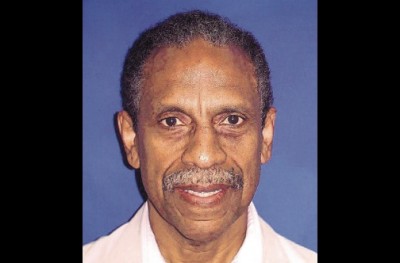
VICE-CHANCELLOR of the University of the West Indies (UWI) Nigel Harris testified yesterday that he was disappointed and “pained” by the decision of fired professor Brendan Bain to go back on his promise to resign as director of the Caribbean HIV/AIDS Regional Training Network (CHART).
“I was very, very distressed to hear of this change of mind,” Harris testified under cross-examination from attorney Georgia Gibson-Henlin, who is representing Bain, in the closely watched case before the Supreme Court.
The UWI fired the noted health professional last May after alleging that his constituents had lost confidence in him following his participation in a case in Belize where a gay man, Caleb Orozco, was challenging the buggery laws of that country.
Bain is suing the UWI for breach of contract, breach of constitutional rights, and defamation over the university’s decision to terminate his contract and the manner in which it had been handled.
Yesterday, Harris testified that during the “firestorm” over Bain’s evidence — which was viewed by some as arguing for the retention of the buggery law in that country — Bain had told him that he would’ve resigned. Questioned by Gibson-Henlin as to the date on which the resignation should’ve taken effect, Harris said that it had not got that far, adding that Bain had given him his word that he would do so.
“His lawyer told you to give him some time to consider,” Gibson-Henlin responded, to which Harris agreed.
But Harris said he was “put off” by the fact that Bain had gone back on his promise to resign. Harris said he has known Bain for 30 years and believed that as a friend of 30 years and a person he had worked with for eight years, he believed he would’ve stood by his word.
He said that when he gave Bain his termination letter in May last year, he had said to him: “Brendan, you have given me your word”.
At an earlier point in the cross-examination, Harris testified that he had wide consultation over an eight-month period with various AIDS and health experts, before coming to a decision to terminate Bain’s contract.
Harris said it was not true that he had been pressured by the Caribbean Vulnerable Communities Coalition to fire Bain.
He said, too, that the funding agencies had nothing to do with the decision to terminate Bain’s contract. “I took the decision, then informed them,” he said.
Regarding the statement issued by the university about the termination of Bain’s contract, Harris said the institution released the statement because there were a lot of inaccurate reports and “misunderstanding” on the issue. The UWI vice-chancellor said he also wanted to make clear, the university’s position on stigma, discrimination and decriminalisation.
Meanwhile, Bain is contending that the UWI owes him money from salary as director for the period October 2014 to January 14, 2015. This came out during cross-examination of UWI bursar Archibald Campbell by Gibson-Henlin.
However, Campbell said that the UWI actually overpaid Bain.
A new defence witness is to take the stand when the matter continues in the Supreme Court on Monday.
